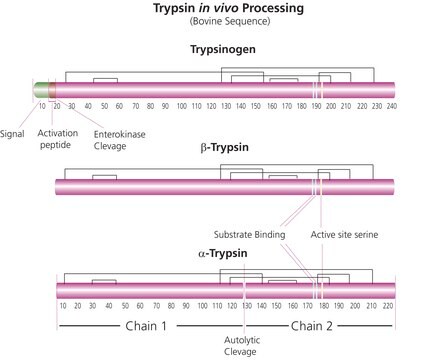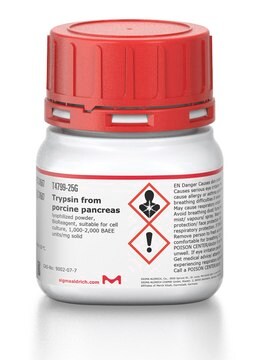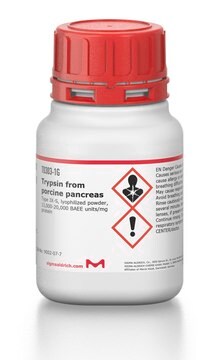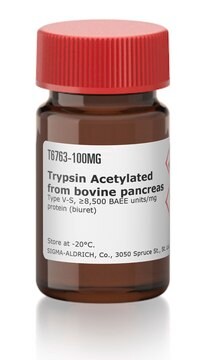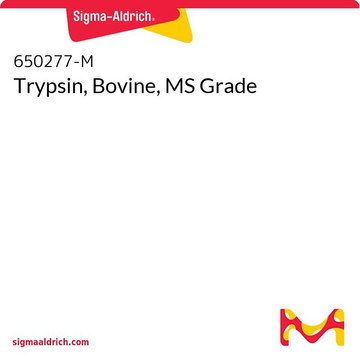4370285
Trypsin, TPCK-Treated
Synonym(e):
Trypsin, TPCK treated for Cell Culture
Anmeldenzur Ansicht organisationsspezifischer und vertraglich vereinbarter Preise
Alle Fotos(1)
About This Item
Empfohlene Produkte
Versandbedingung
dry ice
Lagertemp.
−20°C
Verwandte Kategorien
Allgemeine Beschreibung
Trypsin is a serine protease that specifically hydrolyzes peptide bonds at the carboxyl side of lysine and arginine residues. This modified trypsin has been treated with N-tosyl-L-phenylalanine chloromethyl ketone (TPCK) to inactivate extraneous chymotryptic activity. Each package contains 8 vials, with 25 μg in each vial.
Anwendung
Trypsin, TPCK-Treated has been used:
- as a supplement in Dulbecco′s Modified Eagle Medium (DMEM) for porcine delta coronavirus (PDCoV) infection experiments using epithelial-like pig kidney cell line (LLC-PK1)
- to detach the human umbilical vein endothelial cells (HUVEC) for annexin-V/propidium Iodide (PI) staining assay
- in minimum essential medium (MEM) for multicycle replication kinetics
Biochem./physiol. Wirkung
N-p-Tosyl-L-phenylalanine chloromethyl ketone (TPCK) serves as an irreversible inhibitor of chymotrypsin. Trypsin induces human fibrocyte differentiation. Trypsin is widely used in proteomics for protein sample digestion. In cell culture, trypsinization is carried out to dislodge adherent cells from each other and the walls of the culture vessel.
Signalwort
Danger
H-Sätze
Gefahreneinstufungen
Eye Irrit. 2 - Resp. Sens. 1 - Skin Irrit. 2 - STOT SE 3
Zielorgane
Respiratory system
Lagerklassenschlüssel
10 - Combustible liquids
Flammpunkt (°F)
Not applicable
Flammpunkt (°C)
Not applicable
Hier finden Sie alle aktuellen Versionen:
Analysenzertifikate (COA)
Lot/Batch Number
Leider sind derzeit keine COAs für dieses Produkt online verfügbar.
Wenn Sie Hilfe benötigen, wenden Sie sich bitte an Kundensupport
Besitzen Sie dieses Produkt bereits?
In der Dokumentenbibliothek finden Sie die Dokumentation zu den Produkten, die Sie kürzlich erworben haben.
Kunden haben sich ebenfalls angesehen
Zdeněk Perutka et al.
Molecules (Basel, Switzerland), 23(10) (2018-10-17)
Trypsin is the protease of choice for protein sample digestion in proteomics. The most typical active forms are the single-chain β-trypsin and the two-chain α-trypsin, which is produced by a limited autolysis of β-trypsin. An additional intra-chain split leads to
Jian-Ping Dai et al.
International journal of molecular sciences, 19(4) (2018-03-24)
Oxymatrine (OMT) is a strong immunosuppressive agent that has been used in the clinic for many years. In the present study, by using plaque inhibition, luciferase reporter plasmids, qRT-PCR, western blotting, and ELISA assays, we have investigated the effect and
Wentao Li et al.
Proceedings of the National Academy of Sciences of the United States of America, 115(22), E5135-E5143 (2018-05-16)
Porcine deltacoronavirus (PDCoV), identified in 2012, is a common enteropathogen of swine with worldwide distribution. The source and evolutionary history of this virus is, however, unknown. PDCoV belongs to the Deltacoronavirus genus that comprises predominantly avian CoV. Phylogenetic analysis suggests
Yu Bai et al.
Microbial pathogenesis, 150, 104645-104645 (2020-12-08)
Influenza virus is responsible for significant morbidity and mortality worldwide. Acute lung injury (ALI)/acute respiratory distress syndrome (ARDS) is the major cause of death in influenza virus infected patients. Recent studies indicated that active glucagon like peptide-1 (GLP-1) encoded by
Unser Team von Wissenschaftlern verfügt über Erfahrung in allen Forschungsbereichen einschließlich Life Science, Materialwissenschaften, chemischer Synthese, Chromatographie, Analytik und vielen mehr..
Setzen Sie sich mit dem technischen Dienst in Verbindung.